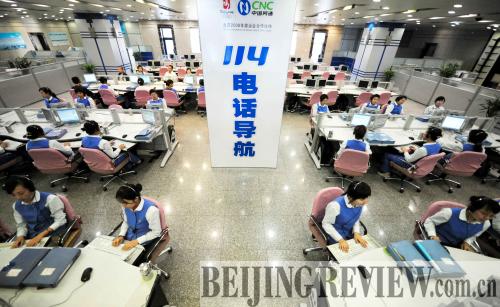|
 |
|
WANG JIANWEI PHONE CASE: After the Anti-Monopoly Law went into effect, several big companies were sued for monopolistic practices. China Netcom, which has been incorporated into China Unicom, was one of the first companies to have litigation brought against it |
The three enforcement authorities of the Anti-Monopoly Law, namely, the State Administration for Industry and Commerce, the National Development and Reform Commission (NDRC) and the Ministry of Commerce, are formulating regulations related to the law in an effort to coordinate their standards, but the specific nature of the work has made the process complicated and slow.
Inadequate attention
While the Anti-Monopoly Law has been in effect for more than one year, many companies have regrettably paid little attention to the regulation, said Wu Hanhong, a professor at the Law School of the Renmin University of China. Actually, to be accepted by the market, big companies must carefully study this law, he said.
The main function of the Anti-Monopoly Law is to maintain fair competition in the market. If any company, state-owned or private, including multinational companies operating in China, conducts behavior against fair competition or market stability, intervention will be taken.
China Mobile, China Netcom and Sinopec, all major companies involved in anti-monopoly cases, serve as prime examples of the Anti-Monopoly Law's intentions. While it is not illegal that these corporations hold dominant market shares, if they abuse their positions purely to gain profits, they would be violating the rules of the Anti-Monopoly Law.
The Anti-Monopoly Law is essential to establishing fair market rules and protecting fair competition, but it will not punish competitive winners, nor will it protect the weak, Wu said. The purpose is to make companies understand what they can and cannot do. However, it will not limit corporate behavior that is beneficial to society, such as innovation, research and development, Wu said.
"I hope Chinese companies can carefully study the rules of this law, particularly to understand that if being punished according to the law, they will pay big costs. " said Wu.
If sued on the basis of violating anti-monopoly regulations, a company may be affected in three ways—its corporate reputation will be damaged, it will have to pay large litigation expenses and, if losing the lawsuit, it will be forced to pay substantial fines, Wu added.
Industrial exemptions
Although the Anti-Monopoly Law requires all companies to abide by its rules, the legislators should consider exempting certain industries that involve state security and resource control, said Wu Hongwei, Deputy Director of the Economic Law Section of the Law School of the Renmin University of China. However, the Anti-Monopoly Law doesn't provide for any leeway in such instances, an aspect of the regulation that many consider flawed.
The scenario for such an exemption would play out well for oil giant Sinopec. Since Sinopec's oil prices are fixed by the NDRC, Sinopec can just float the prices within a specified range based on state regulated prices. For this reason, opposing a monopoly by Sinopec would be to oppose the unreasonable pricing of end products by Sinopec.
But in public service sectors such as petrochemical and power where natural monopolies exist, lowering prices to maintain affordability for the greater population should be fully considered. During certain periods, some industries even need fiscal subsidies from the state to provide public service at affordable prices. Most companies in these sectors are state-owned or state-holding companies, and it would be improper to apply the Anti-Monopoly Law in these sectors at present when they provide a service necessary for the public's well-being, Wu said.
Many industries in Western countries, such as banking and telecommunication sectors, now carry out free competition, but in their primary periods of development they witnessed an abundance of monopolies.
Often times, the government will help nurture industrial leaders through various means, including permissible monopolies or subsidies. The purpose of these sanctioned monopolies is not only to ensure affordability in prices, but also to help companies accumulate economic and technical strength to cope with foreign competition. Only after the industries are well developed will the market be open to free competition and foreign investment. Hence China should be prudent in applying the Anti-Monopoly Law to sectors related to state security and resource control, Wu said.
The present Anti-Monopoly Law, however, contains no clear provisions for exempting application of the law in the industries related to national economic lifelines and state security. This is of no advantage to nurturing internationally competitive companies while enhancing overall national strength, Wu continued.
(This article is based on a recent report in the Economic Information Daily) | 